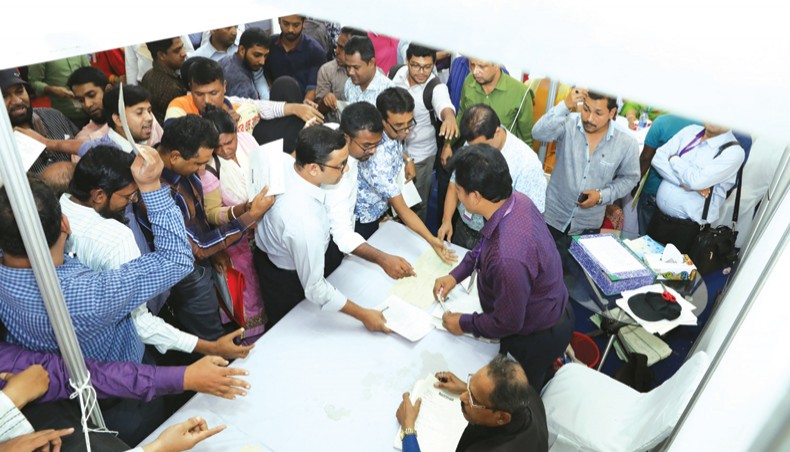
The government has been struggling to increase the collection of income tax despite an increase in the number of rich people who maintain a lifestyle similar to that of citizens in developed countries.
Economists called the phenomenon concerning for policymakers as the less-than-expected incomes from the direct tax were forcing the government to rely on indirect taxes and overburdening the majority of the people belonging to low and fixed-income groups.
The government’s failure to expand the tax net has also been pulling down the tax-GDP ratio, while the borrowing spree from both local and foreign sources has been pushing the country’s debt-tax ratio up.
Both the tax-GDP and the debt-tax ratios should be maintained prudently to check any imbalance between the two vital economic indicators, said Ahsan H Mansur, executive director of the Policy Research Institute.
The country’s tax-to-GDP ratio fell to 7.9 per cent in 2022 from 9.6 per cent in 2015 as the government could not increase revenue collection in proportion to the country’s GDP growth by more than 6 per cent on average in the past decade.
Bangladesh has been ridiculed by many for its tax-to-GDP ratio, one of the lowest in the world.
The country’s overall debt stock in proportion to GDP has remained static at around 36 per cent, but the tax-to-debt ratio has increased to 350 per cent.
Ahsan H Mansur said that the growing tax-to-debt ratio against the falling tax-to-GDP ratio means the government will face challenges in meeting the debt obligation amid shrinking revenue incomes.
The National Board of Revenue is responsible for generating more than 80 per cent of the government’s annual income.
A sudden drop in revenue generation since 2019 due to a drastic cut in income tax rates is among the reasons for Sri Lanka’s economic collapse.
The island country has been facing bankruptcy since the past year, despite its per capita GDP reaching over $4,000, one of the highest in South Asia.
Economists said that the situation in Bangladesh was not so grave as that in Sri Lanka, but the current economic downturn because of dollar shortages exposed the country’s vulnerability on the economic front.
The government has agreed to make reforms under a $4.7 billion loan programme from the International Monetary Fund to tackle the economic downturn.
Increasing the tax-to-GDP ratio in FY24 by an extra 0.5 percentage point in the current FY24 is one of the major conditions for the IMF loan programme.
However, the NBR has expressed its inability to collect Tk 4.10 lakh crore by the end of the current financial year in June.
Finance minister AHM Mustafa Kamal said in a speech in 2020 that around four crore people eligible to pay tax were out of the tax net.
In the past month, commerce minister Tipu Munshi, while addressing a fair, claimed that about four crore people in the country had the purchasing capacity of people in European countries.
Available data showed that only 77 lakh people held a Taxpayers’ Identification Number in June 2022, but less than half of them—34 lakh individuals and 33,905 corporate entities—submitted returns in FY23.
Lack of automation as well as political will over the years and corruption in the NBR have been blamed for the poor revenue generation from direct revenue, also known as progressive taxes, compared to rigorous taxes generated from Value Added Tax and duties.
Transformation towards progressive tax policy has been slow, as the country’s earnings from income taxes account for around 32 to 33 per cent of the total revenue in recent years, compared to 26.59 per cent in 2010-11 and 12.46 per cent in 1979–80, according to data from the finance division.
In India, direct taxes accounted for 51.3 per cent of its total revenue in 2016–17, and the figure rose to 56.4 per cent in 2020–21.
Former World Bank Dhaka office chief economist Zahid Hussain suggested digitization in the tax collection process for higher revenue generation and underscored the need for allocating more funds to the education and health sectors for better human resources ahead of the country’s graduation from the least developed country’s block in 2026.
He, however, lamented that automation of tax collection was still in the primary stage despite efforts in the past two decades.
Lack of automation enables tax officials to apply their discretionary power and harass taxpayers, he said, adding that proper automation was the best way to curb the discretionary power of tax officials.
Mustafa K Mujeri, executive director of the Institute for Inclusive Finance and Development, said that automation, along with synchronisation between NBR, Bangladesh Bank, and other government entities, was imperative to curb tax dodging by income taxpayers.
The economist noted that the number of bank accounts in the country with more than Tk 1 crore in deposits reached 1,10,192 in March 2023 from 1,09,946 in December 2022.
But lack of synchronisation between NBR and BB prevents the tax payment update by the Tk 1 crore depositors.
New Age

